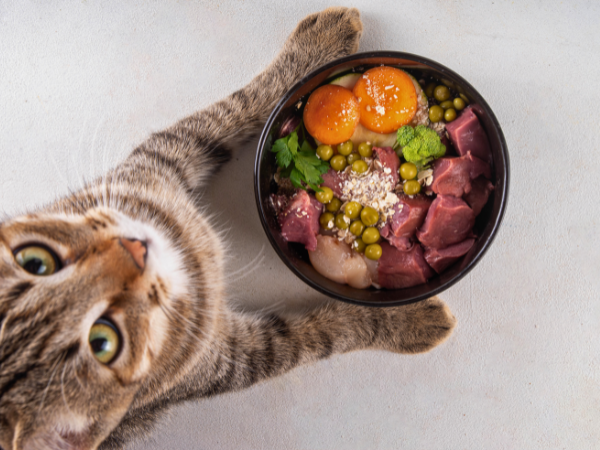Many cats face allergies to common ingredients in their food. This can lead to skin problems, digestive issues, and even behavior changes.
Choosing the right cat food can help reduce these symptoms. In this guide, we will explore the top five cat foods designed specifically for sensitive cats.
Understanding Cat Food Allergies
In 2025, several cat foods stand out for their ability to address these concerns. These specialized diets focus on high-quality ingredients. They aim to reduce allergens and support overall health.
Common Signs Of Food Allergies In Cats
Recognizing food allergies in cats is essential for their well-being. Cats may show various signs when they have food allergies. These signs can vary in severity and may include:
- Itching and scratching: Persistent scratching or biting at the skin.
- Skin infections: Red, inflamed skin or hot spots.
- Digestive issues: Vomiting or diarrhea after eating.
- Ear problems: Frequent ear infections or wax buildup.
- Hair loss: Thinning fur or bald patches.
These symptoms can cause discomfort. They may lead to more serious health issues if left untreated. If you notice any of these signs, consult a veterinarian.
Why Specialized Diets Matter
Ingredients like beef, chicken, or dairy can trigger reactions. Specialized diets use limited ingredients. This helps to identify and avoid allergens.
Benefits of specialized diets include:
- Reduced symptoms: Less itching, better digestion, and healthier skin.
- Improved health: Better overall health and vitality.
- Customized nutrition: Ingredients tailored to sensitive stomachs.
Transitioning to a specialized diet should be gradual. Mix the new food with the old food over a week. This method helps the cat adjust and reduces digestive upset.
How To Choose The Best Food For A Cat With Allergies
Choosing the right food for a cat with allergies is important. This guide helps you find the best options for your furry friend.
Look For Limited Ingredient Diets (LID)
Limited Ingredient Diets (LID) are a great choice for cats with allergies. These diets contain fewer ingredients. This can help identify what causes allergic reactions. LID focuses on high-quality proteins and carbohydrates. Here are some key points:
- Fewer ingredients reduce the chance of allergic reactions.
- Common protein sources include chicken, fish, and lamb.
- Look for grains like rice or potatoes as safe carbs.
When reading labels, focus on:
| Ingredient | Benefits |
|---|---|
| Single Animal Protein | Reduces allergy triggers. |
| Simple Carbohydrates | Easy to digest. |
| No Fillers | Avoids unnecessary ingredients that may cause issues. |
Always check for allergens such as corn, wheat, and soy. These ingredients often cause problems for sensitive cats. A limited ingredient diet simplifies your cat’s nutrition.
Consider Hydrolyzed Protein Formulas
Hydrolyzed protein formulas are another excellent option for cats with allergies. These foods break down proteins into smaller pieces. Smaller proteins are less likely to cause reactions. Here are some benefits:
- Reduces allergic responses.
- Easy for cats to digest.
- Often recommended by veterinarians.
When choosing hydrolyzed protein formulas, pay attention to:
| Aspect | Importance |
|---|---|
| Hydrolyzation Level | Higher levels mean lower risk of allergies. |
| Type of Protein | Common sources include chicken or fish. |
| Brand Reputation | Choose trusted brands with positive reviews. |
Hydrolyzed protein diets often come with vet support. They provide a safe option for managing allergies. Always consult your vet before making a change. This ensures the best choice for your cat’s health.

1. Hill’s Prescription Diet Z/d Skin/food Sensitivities Dry Cat Food
One of the best options available is Hill’s Prescription Diet Dry Cat Food. This formula targets the needs of sensitive cats. It helps reduce allergic reactions and promotes overall health.
Formulated To Minimize Allergic Reactions
This cat food is specially designed to minimize allergic reactions. It uses hydrolyzed proteins that lower the chance of a negative immune response.
Here are some key features of Hill’s Prescription Diet z/d:
- Protein: Hydrolyzed chicken liver, a highly digestible source.
- Fat: Moderate levels with added essential fatty acids for healthy skin.
- Fiber: Balanced fiber blend for digestive health.
- Caloric Content: Approximately 400 kcal/cup, ensuring proper energy levels.
The key ingredients in this formula include:
| Ingredient | Benefit |
|---|---|
| Hydrolyzed chicken | Reduces allergic reactions. |
| Corn starch | Provides easily digestible carbohydrates. |
| Vitamins and minerals | Support overall health and immune function. |
Hill’s Prescription Diet z/d is perfect for cats with food sensitivities. It supports healthy skin and easy digestion. This food helps your cat feel comfortable and active.
2. Royal Canin Veterinary Diet Hydrolyzed Protein Adult Hp Dry Cat Food
The Royal Canin Veterinary Diet is designed for cats with allergies. This specialized formula helps manage food sensitivities effectively. It contains hydrolyzed proteins that reduce allergic reactions.
Supports Digestive And Skin Health
This cat food focuses on enhancing both digestive and skin health. The formula includes a unique blend of ingredients that cater to sensitive cats. Key features include:
- Protein: Hydrolyzed soy protein isolate is used to minimize allergic reactions.
- Fat: Balanced fat content with EPA/DHA supports skin nourishment.
- Fiber: Contains soluble and insoluble fibers to promote gut health.
- Caloric Content: Approximately 370 kcal/cup to maintain energy levels.
The key ingredients include:
| Ingredient | Benefit |
|---|---|
| Hydrolyzed soy protein | Prevents triggering immune responses |
| Brewers rice | Easy to digest carbohydrate source |
| Chicken fat | Provides essential fatty acids |
| Fish oil | Rich in omega-3 fatty acids for a healthy coat |
This food is ideal for cats with gastrointestinal upset or allergic skin reactions. Hydrolyzed proteins help to prevent allergic reactions. Omega-3 fatty acids in fish oil promote a shiny, healthy coat.
3. Natural Balance L.i.d. Green Pea & Duck Formula Dry Cat Food
Natural Balance L.I.D. formula focuses on minimal ingredients, helping sensitive cats thrive without irritation. It uses real duck as the main protein source, making it suitable for cats with food sensitivities.
Simple Ingredients For Sensitive Stomachs
This cat food offers a straightforward approach to nutrition. The ingredients are simple yet effective. Here’s a closer look at what makes this food suitable for sensitive cats:
| Ingredient | Description |
|---|---|
| Protein | Real duck serves as the primary protein source. |
| Fat | Contains moderate fat levels for energy and coat health. |
| Fiber | High in fiber from green peas to aid digestion. |
| Caloric Content | Approximately 350 kcal/cup for balanced nutrition. |
The key ingredients in this formula include:
- Duck
- Green peas
- Canola oil
- Flaxseed
This limited ingredient formula features a single animal protein and contains no grains. It is perfect for cats with multiple food sensitivities or grain allergies. The focus on easy-to-digest ingredients helps reduce gastrointestinal issues.
4. Purina Pro Plan Veterinary Diets Ha Hydrolyzed Feline Formula Dry Cat Food
The Purina Pro Plan Veterinary Diets HA Hydrolyzed Feline Formula is designed specifically for allergy management. It uses hydrolyzed soy protein, which is broken down into smaller pieces. This makes it less likely to cause allergic reactions.
Key benefits of this cat food include:
- Protein: Hydrolyzed soy protein helps reduce allergic responses.
- Fat: Low to moderate fat content includes essential fatty acids, which support overall health.
- Fiber: Contains prebiotic fiber for digestive support, ensuring a healthy gut.
- Caloric Content: Approximately 370 kcal/cup, which is suitable for maintaining a healthy weight.
Here are the key ingredients:
| Ingredient | Benefit |
|---|---|
| Hydrolyzed Soy Protein | Reduces allergic reactions. |
| Rice Starch | Easy to digest carbohydrate source. |
| Canola Oil | Source of essential fatty acids. |
| Fish Oil | Supports skin and coat health. |
This food is veterinary-recommended for managing food allergies. Hydrolyzed proteins prevent allergic reactions while promoting gut health and proper nutrient absorption.
5. Instinct Limited Ingredient Diet Grain-free Real Turkey Recipe Wet Cat Food
The Instinct Limited Ingredient Diet features a single protein source. This is crucial for cats with food sensitivities. Real turkey is the main protein. It helps prevent allergic reactions that can arise from multiple protein sources. By using only turkey, this food minimizes the chances of flare-ups.
Here are some key benefits of using a single protein:
- Reduces the risk of allergies
- Supports easy digestion
- Promotes a healthy coat
By focusing on turkey, this food provides a rich source of protein. Cats thrive on protein, making it essential for their diet.
Grain-free Formula
This cat food is also grain-free. Grains can often trigger allergies in cats. A grain-free formula helps keep your cat’s diet simple. It uses minimal ingredients, which is ideal for sensitive pets.
Key nutritional components of this food include:
| Nutrient | Details |
|---|---|
| Protein | Real turkey |
| Fat | Rich in healthy fats for skin and energy |
| Fiber | Minimal, to support sensitive digestion |
| Caloric Content | Approximately 190 kcal/5.5 oz can |
| Key Ingredients | Turkey, turkey liver, peas, montmorillonite clay |
The grain-free, simple formula is perfect for cats with common food allergies. It uses a single protein and minimal ingredients to minimize the risk of allergic flare-ups.

